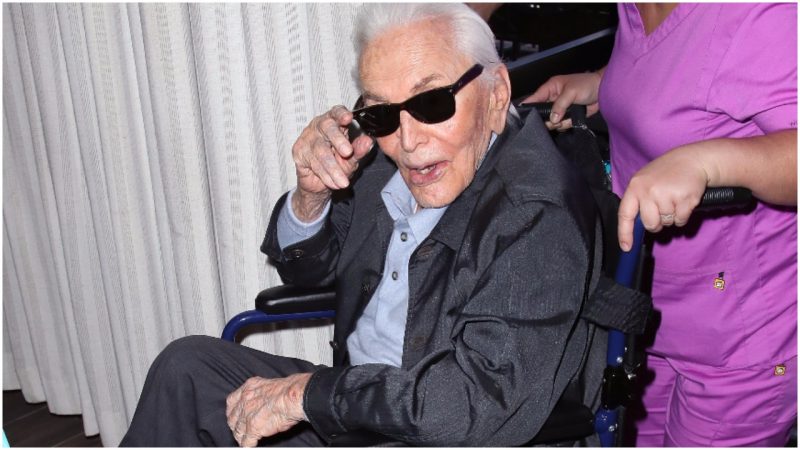Kirk Douglas, one of the last survivors of Hollywood’s golden era, turned the age of 101 on December 9, 2017.
His illustrious career, spanning nearly seven decades, has been filled with triumphs, including three Oscar nominations and an honorary Academy Award for being a creative and moral force in the motion-picture community.
Known for his unforgettable performances in movies such as Champion (1949), Spartacus (1960), The Bad and the Beautiful (1952), and Lust for Life (1956), Douglas, alongside several other iconic actors of the period, set the standard for Hollywood’s tough guy persona, admitting that he’d “made a career playing sons of bitches.”
But if you ask Douglas, the biggest achievement of his life just might be the fact that he helped break the blacklist of the McCarthy era by hiring and crediting screenwriter Dalton Trumbo for Spartacus. Trumbo, a Communist, had been imprisoned in a federal penitentiary for 11 months for refusing to appear before the House Un-American Activities Committee, and his scripts after that used fronts or pseudonyms. After Spartacus, due to Douglas’s intervention in that Stanley Kubrick-directed film, Trumbo was credited for his work, as were other previously blacklisted writers.
Born Issur Danielovitch on December 9, 1916, in Amsterdam, New York, to Russian-Jewish immigrant parents, he grew up poor, and his path to glory was a tough one. But Douglas’ wish to become an actor, combined with his hard work, commitment, and dedication, transformed him into a symbol of 20th-century show business and a true movie star.
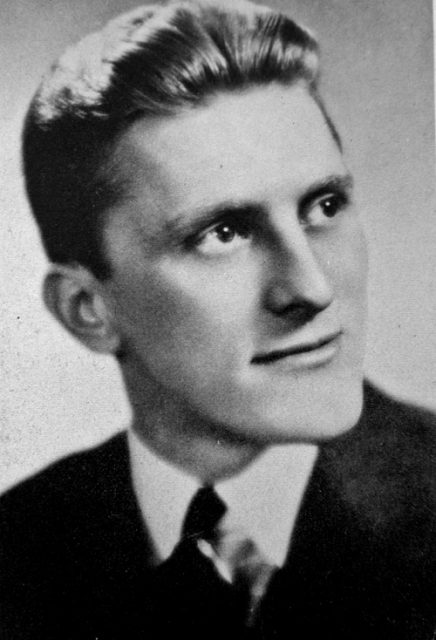
Ever since his earliest years, Douglas knew that he wanted to become an actor, but when one considers that his family struggled to make ends meet, it becomes clear that he needed a true miracle to make it happen. “I wanted to be an actor ever since I was a kid in the second grade. I did a play, and my mother made a black apron, and I played a shoemaker. And my father, who never interested himself in what I was doing, was in the back, and I didn’t know it. After the performance, he gave me my first Oscar: an ice cream cone. I’ve never forgotten that.” Douglas told the Hollywood Reporter in 2012.
Issur Danielovitch held many jobs before he was finally able to make his acting debut. Among other things, he worked as a dishwasher, cashier, lifeguard, security guard, and janitor. Being a good student is what brought him an acting scholarship and an entry into the prestigious American Academy of Dramatic Arts. It was at this point in his life that the future star would become friends with another Hollywood icon, Lauren Bacall, who played a crucial role in launching his film career later on.
His Broadway debut came in 1941, and he appeared in numerous Broadway productions before enlisting in the Navy during World War II, where he served with an anti-submarine patrol in the Pacific before he was discharged due to war injuries. Once home, Danielovitch was advised to choose a different stage name and he eventually settled for Kirk Douglas.
Douglas appeared in several more Broadway productions, but it seemed that his new stage name was not helping a lot since career progression was nowhere to be found for the talented actor. At least not until Lauren Bacall took matters into her own hands.
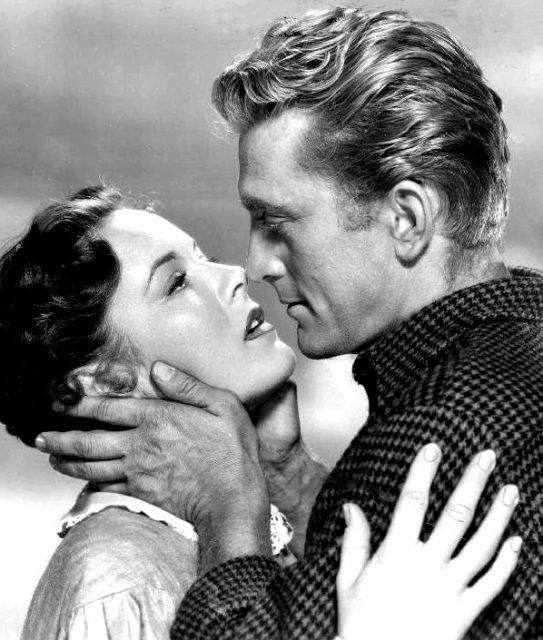
She had already made a name for herself in Hollywood, starring opposite Humphrey Bogart in To Have and Have Not, but, luckily for Douglas and for the entire movie industry, she didn’t forget about her friend from New York. She put in a good word for him to director Hal Wallis and helped Douglas get his first film role in The Strange Loves of Martha Ivers.
In the next few years, Douglas starred in several more movies, including Out of the Past (1947), Mourning Becomes Electra (1947), The Walls of Jericho (1948), My Dear Secretary (1948), and A Letter to Three Wives (1948). But it was his portrayal of the ambitious and ruthless prizefighter in Mark Robson’s Champion that brought him an Oscar nomination and propelled him to stardom. Douglas became an Oscar nominee again in 1952 for The Bad and the Beautiful, and in 1956 for Lust for Life, for which he also won the New York Critics Award.
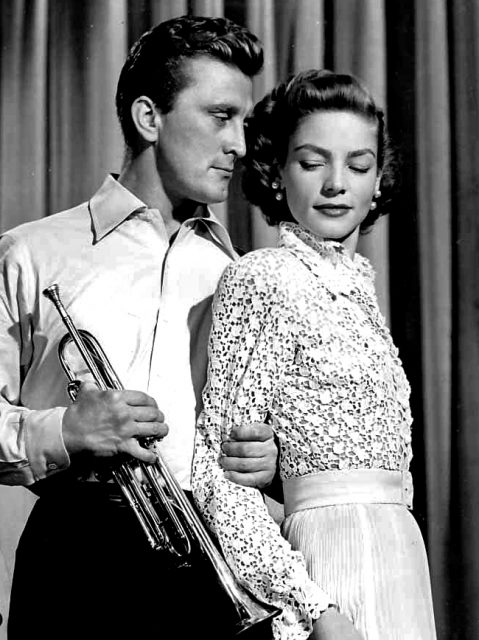
At this point in his career, Douglas was so successful that he could afford to form an independent film company, Bryna Productions, which was named after his mother. He would go on to produce some of the greatest movies in which he appeared, including Paths of Glory (1957), The Vikings (1958), Spartacus (1960), and Seven Days in May (1964).
He appeared in numerous other movies throughout his long career and received many international awards, among which was his appointment in 1990 as Officier de la Legion d’Honneur for distinguished services to France in arts and letters. Additionally, in 1981, President Jimmy Carter awarded him with a Presidential Medal of Freedom, which, as described by the White House website, “is the Nation’s highest civilian honor, presented to individuals who have made especially meritorious contributions to the security or national interests of the United States, to world peace, or to cultural or other significant public or private endeavors.”
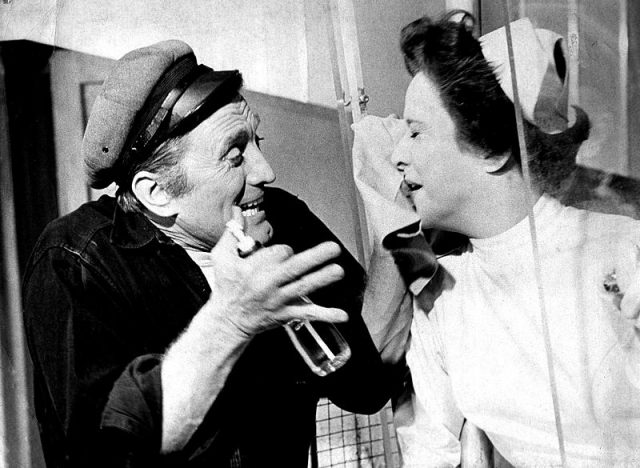
What many people don’t know about Kirk Douglas is the fact that he is one of the most generous philanthropists in Hollywood, having donated millions of dollars to humanitarian causes.
Today, his once blonde hair is snow white and his speech is affected as a result of a stroke, but that doesn’t stop him from appearing in front of the camera.
Read another story from us: Hollywood’s Veterans: The beloved surviving stars of the Golden Age
Kirk Douglas is so much more than just an actor and he has proven this on numerous occasions. As George Clooney once said: “Kirk Douglas is many things. A movie star. An actor. A producer. But he is first and foremost, a man of extraordinary character. The kind that is formed when the stakes are high. The kind we look for in our darkest hour.”
